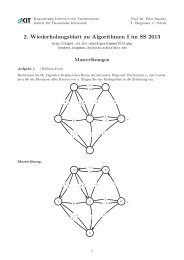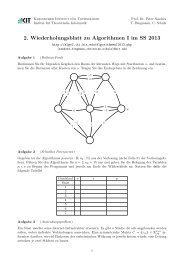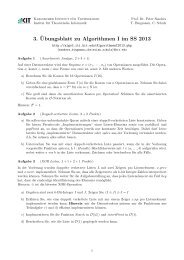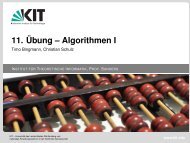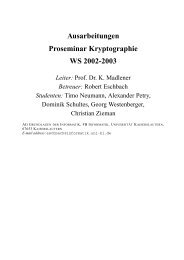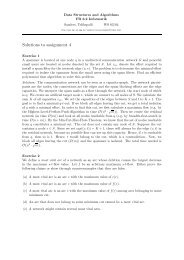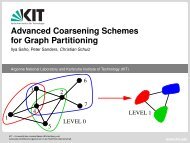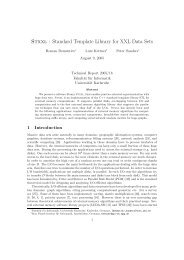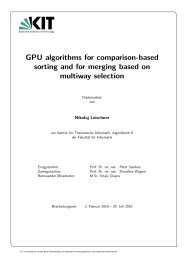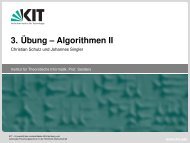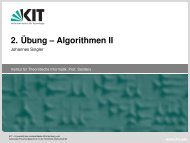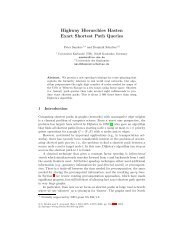LNCS 3142 - The Power of Verification for One-Parameter Agents
LNCS 3142 - The Power of Verification for One-Parameter Agents
LNCS 3142 - The Power of Verification for One-Parameter Agents
Create successful ePaper yourself
Turn your PDF publications into a flip-book with our unique Google optimized e-Paper software.
174 V. Auletta et al.<br />
the optimization problem consists in finding feasible solution X ∗ <strong>for</strong> instance I<br />
such that m(X ∗ ,I)=opt(I) :=goal X∈sol(I) m(X, I).<br />
We consider optimization problems involving selfish agents that privately<br />
know part <strong>of</strong> the input: every instance I is composed <strong>of</strong> a private part t =<br />
(t1,t2,...,tn) (where ti the private in<strong>for</strong>mation <strong>of</strong> agent i) and <strong>of</strong> a public part<br />
σ. We assume that the set <strong>of</strong> feasible solutions sol(I) does not depend on t, that<br />
is, <strong>for</strong> every I =(σ, t) and I ′ =(σ, t ′ ), sol(I) =sol(I ′ ).<br />
2 Truthful Mechanisms <strong>for</strong> Restricted Selfish <strong>Agents</strong><br />
In this section we consider the problem <strong>of</strong> designing truthful mechanisms <strong>for</strong><br />
selfish restricted agents.<br />
Definition 1 (restricted selfish agent). An agent i is overbidding (respectively,<br />
underbidding) if her reported type bi always satisfies bi ≥ ti (respectively,<br />
bi ≤ ti). An agent is restricted if it is overbidding or underbidding.<br />
A mechanism M is truthful <strong>for</strong> restricted selfish agents if, <strong>for</strong> every overbidding<br />
(respectively, underbidding) agent i, u i (ti) ≥ u i (bi), <strong>for</strong> any bi ∈S i with<br />
bi ≥ ti (respectively, bi ≤ ti).<br />
Not to overburden our notation, when algorithm A, the instance σ and the<br />
declarations b−i <strong>of</strong> all the agents other than i are clear from the context, we<br />
will simply write P i (x) to denote the payment awarded to agent i declaring x.<br />
Similarly, we write wi(x) instead <strong>of</strong> wi A ((x, bi),σ).<br />
We first show that any algorithm A admits a payment function PA such that<br />
(A, PA) is a truthful mechanism <strong>for</strong> restricted selfish agents. We give a method<br />
<strong>for</strong> computing the payment function and show that it runs in polynomial time if<br />
A is polynomial-time and <strong>for</strong> each i the set Si <strong>of</strong> the possible strategies or agent<br />
i has polynomial size in the length <strong>of</strong> the input.<br />
<strong>The</strong>orem 1. For any algorithm A there exists a payment function PA =<br />
(P 1 A ,P2 A , ...,Pn A ) such that M =(A, PA) is a truthful mechanism <strong>for</strong> restricted<br />
selfish one-parameter agents. <strong>The</strong> payment functions P i A <strong>for</strong> instance I can be<br />
computed in time polynomial in |S i | and in the running time <strong>of</strong> algorithm A on<br />
inputs <strong>of</strong> length |I|.<br />
Pro<strong>of</strong>. We prove the theorem <strong>for</strong> overbidding agents by explicitly defining the<br />
payment P i (x). Consider agent i and let her strategy set S i be (α i 1 ≤ α i 2 ≤···≤<br />
α i l ). Fix the declarations b−i =(b1, ···,bi−1,bi+1, ···,bm) <strong>of</strong> the other agents.<br />
Since agent i is overbidding to en<strong>for</strong>ce the truthfulness <strong>of</strong> the mechanism we<br />
have to impose that <strong>for</strong> every bi,ti ∈S i , with bi ≥ ti, it holds that<br />
P i (ti) − w i (ti) · ti ≥ P i (bi) − w i (bi) · ti.<br />
Observe that if ti is the largest value in S i then the agent cannot lie and the above<br />
condition trivially holds <strong>for</strong> any payment. For example, we can set P i (α i l ):=



